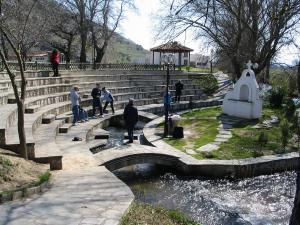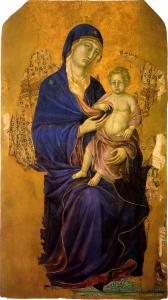(Lectionary for May 13, 2018)
 It has long been striking, and quite disheartening, to note the continued male dominance I find in the church. This troubling fact is accompanied by no little irony. It has long been the case, literally for centuries, that women have been the majority of church attendees. The figure has circled around 60-65% in most parishes. Just look around your sanctuary this Sunday and see whether or not your eyes confirm this fact. And yet, the percentage of church leadership—clergy, higher administrative roles, committee chairs, especially finance and trustees—is predominantly male. I fully realize that this reality is largely based in society’s patterns, where men handle the money and the power still in overwhelming numbers.
It has long been striking, and quite disheartening, to note the continued male dominance I find in the church. This troubling fact is accompanied by no little irony. It has long been the case, literally for centuries, that women have been the majority of church attendees. The figure has circled around 60-65% in most parishes. Just look around your sanctuary this Sunday and see whether or not your eyes confirm this fact. And yet, the percentage of church leadership—clergy, higher administrative roles, committee chairs, especially finance and trustees—is predominantly male. I fully realize that this reality is largely based in society’s patterns, where men handle the money and the power still in overwhelming numbers.
Still, the church prides itself as a new way of viewing things, a new world inaugurated by a radical Jesus who represents a sharp challenge to the way his culture ordered things. He spoke to women publically when it was simply not done; he consorted with all manner of persons whom society dubbed sinners, from lepers to tax collectors to women who did not know their place in the background. Given all of that, the church remains largely a mirror of a patriarchal world. As often as the Roman Catholic Church studies the contested problem of female priesthood, the answer always comes back; “Well, Jesus chose only men for his inner circle, and so, only men can be ordained priests.” And though several Protestant denominations, including my own United Methodist one, has ordained women to clergy leadership for decades, they still toil in a patriarchal club. I am a male clergyperson, but I have numerous female colleagues who are not loath to share their struggles with many of their dominant male colleagues.
The question of “why” simply cannot be avoided by anyone who finds this situation nearly ubiquitous and deeply troubling. By way of at least a partial answer, we read Acts 1:15-26. Luke’s lengthy theological history of the life, death, and resurrection of Jesus of Nazareth coupled with the beginnings and rapid growth of the Christian Church in the Mediterranean basin focuses careful attention on the major figures of that story. Along with Jesus and Paul, we find extensive looks at Peter, the Roman Centurion, Cornelius, and the procurator Pilate. In addition, it has long been observed that Luke has special interest in the roles of the women who followed Jesus and who vastly aided the earliest communities of Christians with direct support and financial resources.  Luke speaks of Lydia, the woman made wealthy in the purple dye trade, of Priscilla, an early missionary who may have, along with her husband Aquila, founded the church in Rome. And of course, Jesus’s mother, Mary, gets a long and rich treatment in her Magnificat and multiple appearances throughout the life and death of her son, not to mention her presence in our text today.
Luke speaks of Lydia, the woman made wealthy in the purple dye trade, of Priscilla, an early missionary who may have, along with her husband Aquila, founded the church in Rome. And of course, Jesus’s mother, Mary, gets a long and rich treatment in her Magnificat and multiple appearances throughout the life and death of her son, not to mention her presence in our text today.
All of this is to say that Luke’s interest in the women around Jesus is not trivial, since he places women squarely at the heart of the ministry, both before and after his death. Would then it not have been wonderful, indeed church changing, if when someone was needed to replace the disgraced Judas, a woman could have been one of those chosen? And why not? Had they not proven themselves again and again as pillars of the ministry and early communities? Was it not so that only the women witnessed the horrors of the crucifixion and were the first witnesses and evangelists of the miracle of the resurrection? This wonderful fact is found in all four of the gospels, meaning that all four evangelists knew well the reality of the women witnesses and dared not leave them out of the greatest story ever told. And yet, when Judas needed replacing, according to Luke only the names of two men, Justus, also known as Joseph Barsabbas and Matthias, were raised up for choice. And like the women, Justus passed from the pages of history as also- rans in the place of real leadership, when Matthias was chosen.
We know precisely nothing of Joseph Barsabbas or Matthias, yet we know much of Mary and Lydia and Mary Magdalene and Salome and Priscilla. We even know more of the disgraced and greedy Sapphira! Just why would Luke not give us a woman as one of the twelve? I can only conclude that though Luke presented the radical gospel of Jesus, he finally did not represent that radical news fully; in the end he too was a child of his time and not of Jesus’s promised realm.
And because that is true, we in our time must not fall into the biblical trap of assuming that the Bible and its ancient context must be determinative for the ways that we appropriate what Jesus offers to us now. We modern Christians eat shrimp readily, knowing full well that shrimp eating, along with crab, lobster, and other delicacies from the sea, is directly proscribed in Leviticus 11. To justify shrimp eating, we turn to Acts 10 and Peter’s dream that bids him eat everything that comes from God’s good hand. Why then do we hide behind the historical theological tale that Jesus chose only men for his inner circle when we have story after story of women teaching and leading and supporting and paying during Jesus’s life and afterwards, too? This way of thinking is not only anachronistic; it is absurd, both biblically and reasonably. Surely, in the 21st century it is far past time to continue to relegate women to a churchly second-class citizenship. Our Roman Catholic and Greek Orthodox and Southern Baptist and Church of Christ friends are plainly wrong on this question and in the spirit of ecumenical engagement and truth telling, they should be confronted with their error on this subject. To paraphrase the story of the Ethiopian eunuch and his meeting with Philip, “What is there to prevent their ordination? Here is the Bible’s own witness. And here is water. If they may be baptized, they must be ordained if called to that ministry.”
Luke missed a golden opportunity in this story from Acts 1, and, much to many women’s horror, renewed the patriarchy of his own time and willed it once again to ours. We can do better; we must do better. The God who created us all, male and female, in God’s very image, expects of us nothing less.
(Images from Wikimedia Commons)












